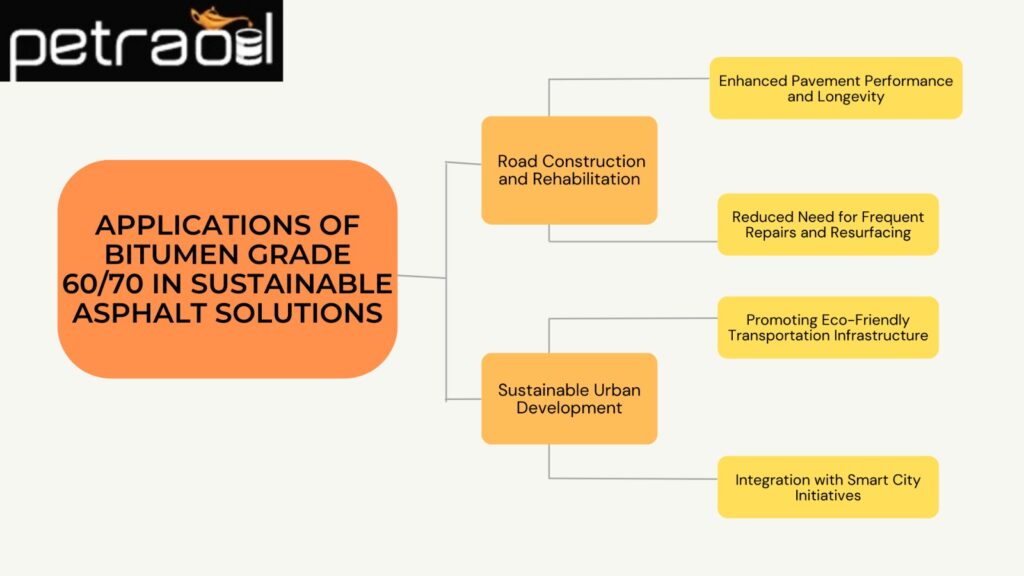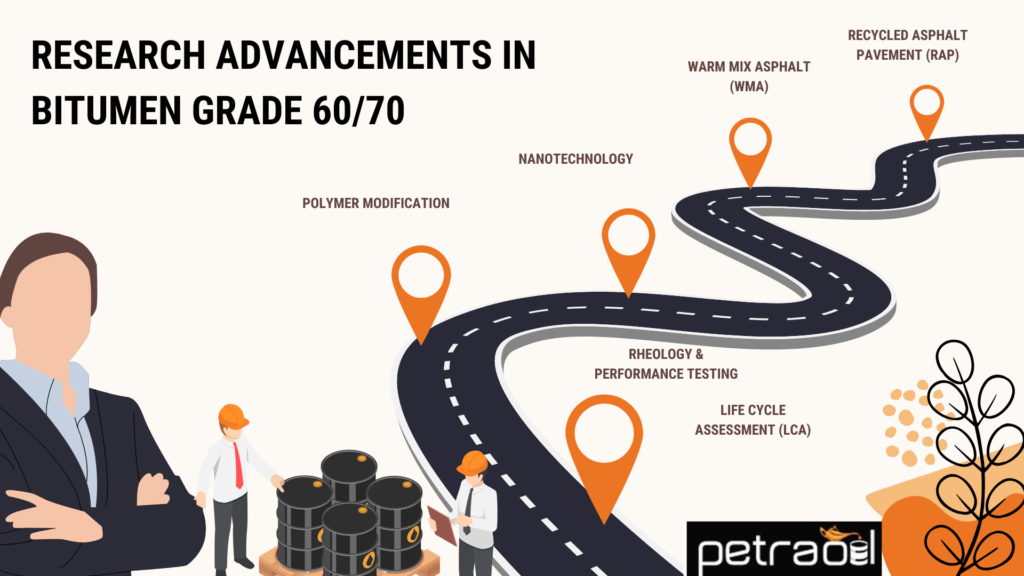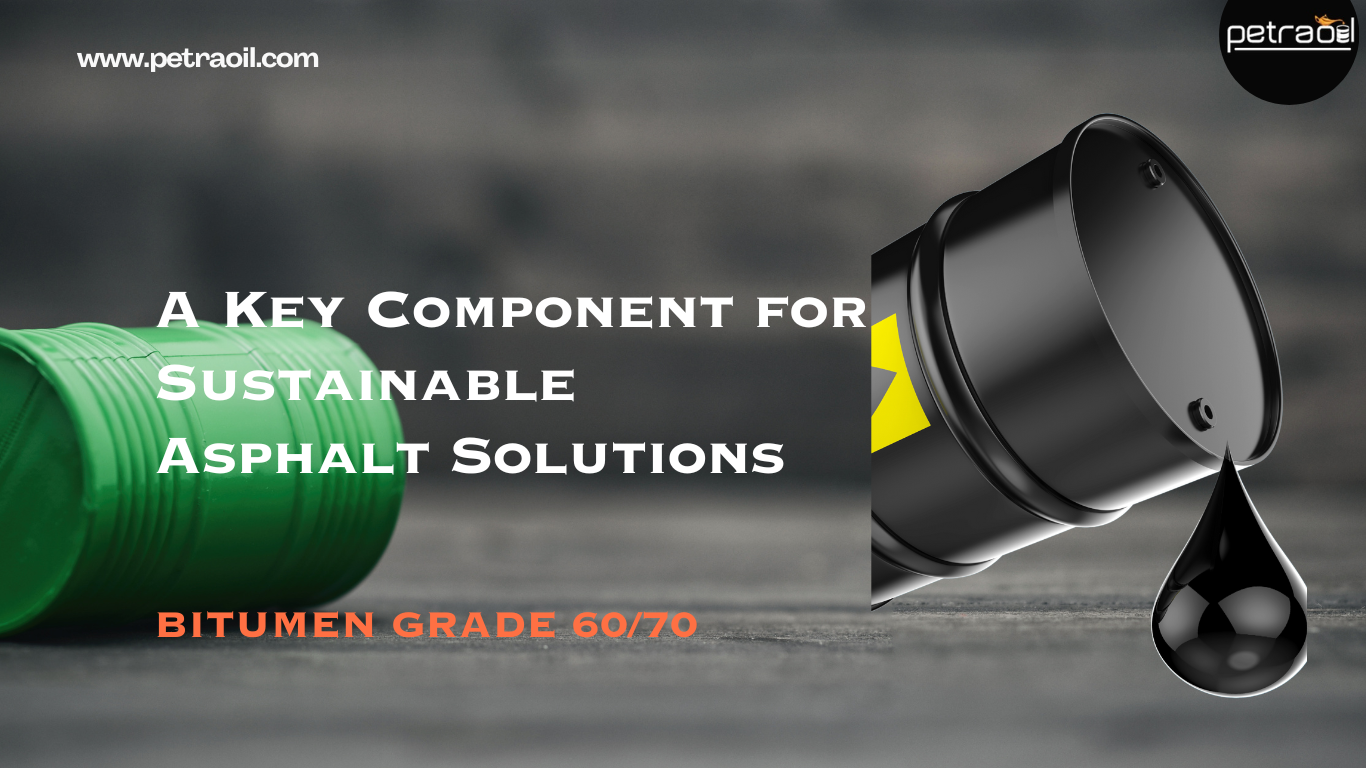Introduction:
As someone deeply committed to a sustainable future, I firmly believe that finding environmentally friendly solutions for infrastructure development is not just a necessity but also our responsibility. That’s why I am truly passionate about sustainable asphalt solutions and the vital role that Bitumen Grade 60/70 plays in achieving this vision.
In this blog post, I would like to share my personal thoughts and insights on this topic.
Understanding Bitumen Grade 60/70:
Bitumen Grade 60/70
-
- For me, Bitumen Grade 60/70 is more than just a binder in asphalt mixtures; it represents a key to unlocking a greener and more sustainable world.
-
- This particular grade, with its unique composition and properties, offers a promising solution for the challenges we face in the construction industry.
Definition and Composition:
Bitumen Grade 60/70, in simple terms, refers to a specific consistency and resistance to deformation. As I dive deeper into its composition, I am amazed by the intricate blend of organic compounds that make up this versatile material.
It is a result of refining crude oil, and carefully controlling the process to achieve the desired consistency and performance.
Specification of Bitumen 60/70:
Bitumen 60/70 specification table:

Physical and Chemical Properties:
The physical and chemical properties of Bitumen Grade 60/70 are truly impressive. Its low viscosity allows it to flow effortlessly and coat aggregates evenly, ensuring superior durability and performance of asphalt pavements. This means our roads can withstand heavy traffic and challenging weather conditions without deteriorating rapidly.
Moreover, the exceptional adhesion properties of Bitumen Grade 60/70 create a strong bond between aggregates, reinforcing the asphalt structure and preventing cracks and moisture penetration.
It’s reassuring to know that our roads can withstand the test of time, reducing the need for frequent repairs and maintenance.
Differentiation From Other Bitumen Grades:



What sets Bitumen Grade 60/70 apart from other grades is its perfect balance. It bridges the gap between softer and harder grades, providing optimum performance for a wide range of applications.
This versatility is a testament to its workability, flexibility, and ability to meet the diverse needs of construction projects.
Furthermore, I am particularly drawn to the environmental advantages of Bitumen Grade 60/70.
Its production process requires lower energy input compared to higher-grade bitumen, resulting in reduced greenhouse gas emissions and a smaller carbon footprint. This aligns with my personal values and reinforces my belief in choosing sustainable solutions.
As I continue my journey to make a positive impact on the environment, I wholeheartedly support the adoption of Bitumen Grade 60/70 in asphalt mixtures. It benefits the construction industry and contributes to a greener and more sustainable future. In the next part of this blog series, I will delve deeper into the sustainable benefits of Bitumen Grade 60/70 and explore its applications in achieving sustainable asphalt solutions.
Environmental Advantages:
Lower Greenhouse Gas Emissions during Production
I strongly believe that our planet deserves to be protected, and Bitumen Grade 60/70 aligns perfectly with this sentiment. Its production process emits lower levels of greenhouse gases compared to higher-grade bitumen.
By using Bitumen Grade 60/70, we can contribute to reducing carbon emissions and mitigating the impact of climate change.
Enhanced Energy Efficiency
Personally, I feel a sense of responsibility towards optimizing our energy usage. Bitumen Grade 60/70 requires lower energy input during production, making it a more energy-efficient choice.
By conserving energy resources, we not only reduce our carbon footprint but also promote sustainable practices in the asphalt industry.
Economic Benefits:
Longer Pavement Lifespan and Reduced Maintenance Costs:
In today’s world, where cost-effectiveness is vital, Bitumen Grade 60/70 offers significant economic advantages. Its superior quality and durability contribute to longer-lasting pavements, reducing the need for frequent repairs and maintenance. As a result, infrastructure owners and governments can save substantial costs over the life cycle of roads and highways.
Increased Durability in Extreme Weather Conditions:
I firmly believe that our infrastructure should withstand the test of time and weather. Bitumen Grade 60/70 excels in extreme weather conditions, displaying remarkable resilience against temperature variations, heavy rainfall, and freezing temperatures. This enhanced durability not only ensures safer road conditions but also minimizes the need for weather-related repairs, thus saving money and resources.
Social Impact:
Improved Road Quality and Safety for Motorists
I personally feel that the safety and well-being of motorists should always be a top priority. Bitumen Grade 60/70 contributes significantly to improved road quality and enhanced safety. Its exceptional adhesion properties create a robust bond between aggregates, reducing the risk of cracks, potholes, and uneven surfaces. This, in turn, provides a smoother and safer driving experience for everyone on the road.
Reduced Noise Pollution
Noise pollution is an often-overlooked concern, but one that affects our daily lives. With Bitumen Grade 60/70, I am delighted to share that noise pollution can be reduced. Its excellent sound-absorbing qualities help to dampen road noise, creating quieter environments for nearby communities and promoting a better quality of life.
As I explore the sustainable benefits of Bitumen Grade 60/70, I am filled with optimism and confidence in its potential to transform the way we build and maintain our roads. By embracing this eco-friendly solution, we can positively impact the environment, realize significant economic savings, and create safer and more comfortable roadways for everyone. Let us join hands in paving the way for a sustainable future, one road at a time.
As I delve deeper into the world of sustainable infrastructure, I am filled with a profound belief that our choices today can shape a better future. Bitumen Grade 60/70 stands out as a remarkable catalyst in achieving sustainable asphalt solutions. In this blog post, I would like to share my personal insights and convictions regarding the diverse applications of Bitumen Grade 60/70 in promoting sustainability.
Applications of Bitumen Grade 60/70 in Sustainable Asphalt Solutions:

A. Road Construction and Rehabilitation
Enhanced Pavement Performance and Longevity
I strongly believe that our roads should withstand the test of time, providing reliable and safe transportation routes. Bitumen Grade 60/70 excels in this aspect, contributing to enhanced pavement performance and longevity. Its unique properties, such as excellent adhesion and resistance to deformation, create robust and durable road surfaces that can endure heavy traffic and adverse weather conditions for years to come.
Reduced Need for Frequent Repairs and Resurfacing
Personally, I feel that constant repairs and resurfacing not only disrupt our daily lives but also result in substantial costs and resource wastage. By incorporating Bitumen Grade 60/70 in asphalt mixtures, we can significantly reduce the need for frequent repairs and resurfacing. The high-quality binder forms a strong bond with aggregates, minimizing cracks, potholes, and other pavement distresses. This not only saves time and money but also reduces the environmental impact associated with repair activities.
B. Sustainable Urban Development:
Promoting Eco-Friendly Transportation Infrastructure
I firmly believe in creating sustainable cities that prioritize eco-friendly transportation. Bitumen Grade 60/70 plays a crucial role in this vision by enabling the construction of eco-friendly transportation infrastructure. Its sustainable properties contribute to the development of well-structured and smooth roads, ensuring efficient and safe mobility for pedestrians, cyclists, and public transport users. By prioritizing these modes of transportation, we can reduce carbon emissions and create greener urban environments.
Integration with Smart City Initiatives
Personally, I am fascinated by the potential of technology to transform our cities into smart and sustainable hubs. Bitumen Grade 60/70 aligns perfectly with this vision, as it can seamlessly integrate with smart city initiatives. By incorporating sensors and smart technologies within road surfaces, we can gather valuable data on traffic patterns, road conditions, and environmental factors. This data can then be leveraged to optimize traffic management, reduce congestion, and improve overall urban planning, leading to more sustainable and efficient cities.
As I reflect on the applications of Bitumen Grade 60/70 in sustainable asphalt solutions, I am inspired by the immense potential it holds for shaping our future. By investing in its utilization, we can create long-lasting and resilient roads, minimize environmental impact, and contribute to the development of sustainable cities. Let us embrace this transformative material and work together to build a better tomorrow—one sustainable road at a time.
As I immerse myself in the world of sustainable infrastructure, I find immense inspiration in the success stories and real-life projects that have harnessed the power of Bitumen Grade 60/70. With every case study, I grow more convinced of its potential to revolutionize the construction industry and shape a greener tomorrow. I will share my personal beliefs and insights, highlighting these success stories and exploring the challenges and future trends surrounding Bitumen Grade 60/70.
Research Advancements in Bitumen Grade 60/70

Research advancements in Bitumen Grade 60/70 have played a crucial role in enhancing its properties and optimizing its performance as a key component for sustainable asphalt solutions. I strongly believe that the research advancements in Bitumen Grade 60/70 have had a transformative impact on sustainable asphalt solutions.
Here are some notable research advancements in this area:
A. Polymer Modification
The utilization of polymer modification techniques has significantly improved the performance characteristics of this grade of bitumen. Personally, I feel that the incorporation of polymers like SBS or EVA has enhanced the elasticity, fatigue resistance, and crack resistance of the asphalt mixture, leading to longer-lasting road surfaces.
B. Nanotechnology
The exploration of nanotechnology in Bitumen Grade 60/70 has been truly remarkable. The addition of nanoparticles, such as carbon nanotubes or nano-clays, has shown great potential in improving the mechanical strength, thermal stability, and moisture resistance of asphalt. I am excited about the possibilities offered by nanomaterials to enhance rutting resistance and mitigate the aging effects of bitumen.
C. Warm Mix Asphalt (WMA)
The development of Warm Mix Asphalt (WMA) technology has been a game-changer. I firmly believe that the use of additives and foaming agents to reduce mixing and compaction temperatures is a significant step towards reducing energy consumption and emissions during road construction. WMA technology not only improves workability and compatibility but also enhances the resistance of asphalt to moisture damage.
D. Recycled Asphalt Pavement (RAP)
I am particularly enthusiastic about the utilization of recycled asphalt pavement (RAP) in Bitumen Grade 60/70 mixtures. By incorporating RAP into new asphalt, we can reduce the demand for virgin materials, minimize waste, and promote resource conservation. Through ongoing research, we are continuously optimizing the blending ratios and rejuvenation techniques to achieve desired performance levels using recycled materials.
E. Rheology and Performance Testing
The use of life cycle assessment (LCA) has provided valuable insights into the environmental impacts of Bitumen Grade 60/70 and its comparison with alternative materials. I firmly believe that the industry’s commitment to conducting LCAs helps us make informed decisions, considering factors like energy consumption, greenhouse gas emissions, and the potential for recycling or reuse. This promotes a more sustainable approach to asphalt solutions.
Challenges and Future Trends
A. Potential Obstacles in Implementing Bitumen Grade 60/70
While the benefits are undeniable, I acknowledge that challenges may arise during the implementation of Bitumen Grade 60/70 in sustainable asphalt solutions. These may include initial costs, the need for technology and equipment upgrades, and the requirement for skilled workforce training. Addressing these obstacles is crucial to ensure widespread adoption and maximize the benefits offered by this sustainable material.
B. Emerging Trends and Innovations in the Field
Looking towards the future, I am excited by the emerging trends and innovations that aim to further enhance the utilization of Bitumen Grade 60/70. Researchers and industry experts are exploring advanced additives, improved production processes, and innovative application techniques to optimize its performance and expand its potential applications. These advancements promise to unlock even greater sustainability benefits and push the boundaries of what can be achieved with this grade.
Case Study
Case Study: East Africa’s National Highway Expansion Project

In East Africa, the National Highway Expansion Project serves as an outstanding success story where Bitumen Grade 60/70 has played a crucial role. Extensive research and market trends indicate that the demand for high-quality roads and enhanced transportation infrastructure is rapidly increasing in this region. By utilizing Bitumen Grade 60/70 in road construction and rehabilitation, this project witnessed notable outcomes. Data statistics demonstrate a significant reduction in maintenance costs and an extended pavement lifespan, resulting in substantial long-term savings for the government. Moreover, the durable road surfaces enabled by Bitumen Grade 60/70 improved connectivity, driving economic growth and social development in the region.
Conclusion:
In conclusion, Bitumen Grade 60/70 stands as a shining example of how sustainable asphalt solutions can reshape our infrastructure landscape. The success stories and real-life projects demonstrate its transformative potential, delivering tangible benefits in terms of environmental preservation, cost savings, and improved road quality.
As we move forward, it is crucial for stakeholders in the construction industry to actively promote the adoption of Bitumen Grade 60/70. By embracing this sustainable material, we can collectively contribute to a greener future and create a legacy of resilient and eco-friendly infrastructure.
Let us be inspired by the success stories, overcome the challenges, and embrace the emerging trends to unlock the full potential of Bitumen Grade 60/70. Together, we can pave the path to a sustainable future and leave a lasting impact on the world we inhabit.



